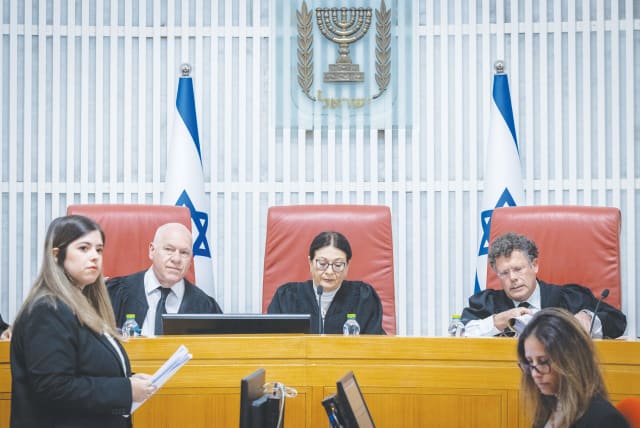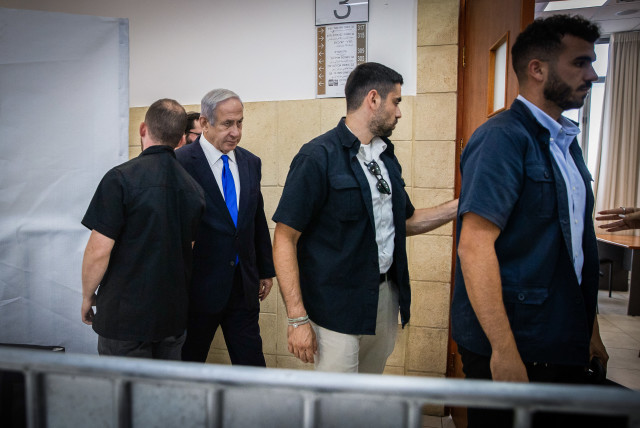Netanyahu trial leak: High Court won't deal in decision not to probe

A main issue that decided the attorney-general's position was that it would be extremely unlikely to secure a criminal conviction, while invading the privacy of a great many people.
The High Court of Justice will not interfere in the Attorney-General Office's decision not to open a criminal investigation into leaks to the media about Prime Minister Benjamin Netanyahu's Case 1000 corruption trial, the court ruled on Monday night.
Netanyahu had filed a petition to the court over the attorney-general's decision in 2021 over leaks that they allege damaged the trial proceedings and the prime minister's image. The court rejected the petition, but decried leaks as an evil.
Businessman Arnon Milchan's personal assistant Hadas Klein in 2015 gave investigators information regarding a piece of jewelry purchased for and gifted to the prime minister's wife, Sara Netanyahu. In 2021 the investigation into the information had finished and the gag order was lifted -- but before the information was transferred to the defense attorneys, it was leaked to the press.
Why didn't the attorney-general open an investigation into the leak for Netanyahu's trial?
The attorney-general decided not to open a criminal investigation for several reasons, but did initiate a project to prevent future leaks. The amount of damage to the case was deemed minimal, the office decided, and the gag order had already been lifted at the time. While a public servant might be criminally liable, the information could have also been provided from the original sources that spoke to investigators during the several years of research.
A main issue that decided the attorney-general's position was that it would be extremely unlikely to secure a criminal conviction, while invading the privacy of a great many people. The investigation had spanned several years, and involved many public servants and private citizens. There were too many people that could have leaked the information. To conduct the investigation into the leaks, the police would have to comb through all their lives going back years.
The Netanyahu team argued that the damage done indeed warranted criminal investigation; a position to which the court was sympathetic. The court said that the phenomenon of investigation leaks damaged public trust in law enforcement and belief that they were acting fairly.
"Caution in taking criminal proceedings is indeed necessary and important," said Justice Noam Sohlberg. "But excessive caution is likely to lead to the closing of the door on effective investigation and adequate treatment of the sick evil of such leaks."
The petition had argued that it was possible to investigate suspected leakers, given that there was a short list of 150 public servants, an extended list of 260, and there were measures to easily rule the suspects out.
The court agreed with the Attorney-General's Office that it would be extremely difficult not just to investigate a crime with so many suspects within several years, but also one that occurred years after Netanyahu's petition.
The chief consideration of the court was if it was such an extreme case that it warranted interference of the judiciary beyond its normal bounds and in the authority of law enforcement. The court decided that its intervention was not proven warranted, and it referred to the professional considerations of law enforcement and the Attorney-General's Office.
Case 1000, also known as the "illegal gifts affair," alleges that Netanyahu received expensive gifts from Milchan and businessman James Packer while he provided personal and business favors.
Milchan's testimony finished in early July, lasting two weeks. The Netanyahu trials have since focused on Case 4000, in which Netanyahu is alleged to have advanced regulations favorable to Bezeq owner Shaul Elovitch in return for positive coverage on the Walla website. The court heard testimonies from Walla editors who worked at the newsroom during the relevant periods. On Tuesday the testimony of former deputy editor-In-chief Udi Hirsch finished, and the former editor-in-chief Yinon Magal began.
Magal had said that CEO Ilan Yeshua had attempted to balance out coverage of the website, since it was hostile against Netanyahu. The prosecution said this was a contradiction to his statements to the police in initial investigations. Magal had been shown a critical article on Netanyahu which he said was legitimate, and denied that the website was biased against Netanyahu. He said that the objective, which is why it annoyed him when there was interference. He had told police that there was pressure, as always, to cover Netanyahu sympathetically near the election period.
The prosecution said that it presented correspondence with Yeshua that allegedly showed requests to take down stories about Netanyahu.
Jerusalem Post Store
`; document.getElementById("linkPremium").innerHTML = cont; var divWithLink = document.getElementById("premium-link"); if (divWithLink !== null && divWithLink !== 'undefined') { divWithLink.style.border = "solid 1px #cb0f3e"; divWithLink.style.textAlign = "center"; divWithLink.style.marginBottom = "15px"; divWithLink.style.marginTop = "15px"; divWithLink.style.width = "100%"; divWithLink.style.backgroundColor = "#122952"; divWithLink.style.color = "#ffffff"; divWithLink.style.lineHeight = "1.5"; } } (function (v, i) { });

